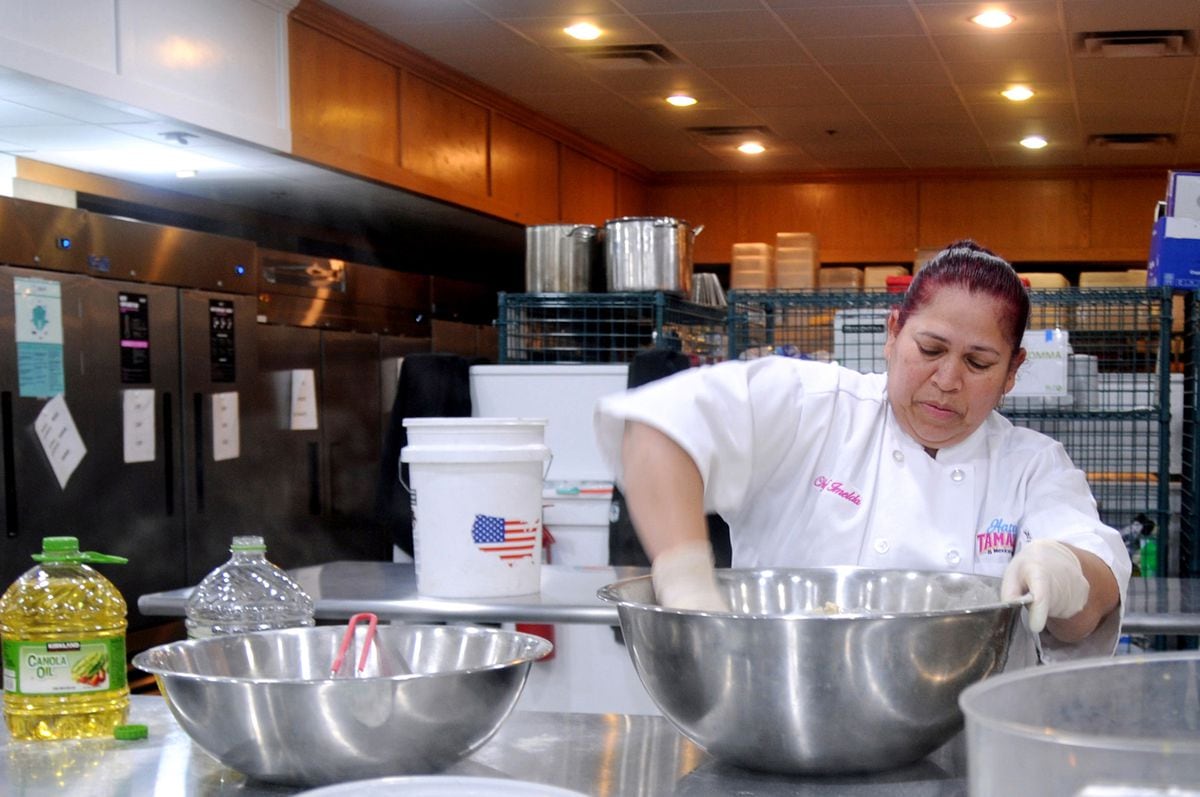Until a few years ago, Imelda Hartley sold tamales on the street in front of a laundromat in Phoenix, Arizona, and a week from now she will be bringing the famous Mexican dish to the setting of one of the biggest (and most expensive) sporting events in the world.
The arrival of the Super Bowl is a reason for hope for this 52-year-old Mexican migrant who arrived in the United States at the age of 14 from the State of Sinaloa.
Hartley, the last name she adopted from her American ex-husband, does not even have a fixed restaurant yet, but thanks to various support programs she has managed to scale her small business to the giant of American football.
“My biggest dream is to be able to sell the tamales in my own store and build a place with our own kitchen.
I want us to make ourselves known, show our vision and reach the viewers."
The arrival of Imelda Ontiveros (her birth name) in the United States happened almost by mistake and without knowing it.
She traveled to Tijuana, in Baja California, to look for her older brother, about whom she did not have much information and, later, she would discover that she lived about 177 kilometers from the place, in Mexicali.
The surprise adventure began when she went looking for food after she worked up an appetite.
She recounts that she got on a bus that read "Tijuana beach" and once there, she began to walk on the sand.
“I crossed into the US without knowing it,” she says.
Once on the other side of the border, he spent several years in San Diego, California, and later moved with his children to Phoenix, where he began to formalize and develop Happy Tamales, a project he founded in 2015 and which, eight years later, , has led it to be one of the providers of the massive sporting event.
The beginning of the project arose as a necessity.
“Tamales are part of my heritage.
I make them on Candlemas Day or New Year's Eve.
I sent my children for their lunch, and soon orders began to arrive, from a teacher and from a parent," says the cook, who later began to sell them by the dozen in front of a laundromat to survive.
Hartley graduated from the Consular Entrepreneurship Program for Mexican Women Abroad (PCEME), an initiative promoted by the Consulate of Mexico in Phoenix that tries to give Mexican women the tools to strengthen or create their business.
There, and after taking an entrepreneurship course, she launched Happy Tamales.
Now rent one of the ghost kitchens (
ghost kitchen
), a kitchen in which she prepares take-out meals, with the hope of being able to set up a business in which she has her own workplace.
With her participation in Taste of the NFL, the annual Super Bowl-fuelled culinary event created to raise awareness and funds to fight hunger, she will make her wish come true.
Hartley in a kitchen in Pheonix (Arizona), on January 27. Aron Hsiao María León (EFE)
“Hope” tamale with green sauce
Over the phone, Hartley begins to name some of his tamales: the
“joy”
(joy), a sweet potato-based tamale;
the “new beginning”, with plantains as a base and baked vegetables;
or the “
hope
” (Hope), which has a green sauce in his own way, “with a touch”.
The names of each tamale evoke the believing feeling of a woman that every time she says goodbye she gives her blessings.
The Mexican cook says that her secret in the kitchen is to “pray”.
“I want my tamales to not only fill and enter the soul and body, but also bring happiness,” she explains.
In the eight years of professionalizing the business, Hartley has tried to support victims of violence, like the one she herself suffered for 20 years at the hands of her partners.
In those two decades, Hartley suffered physical and psychological assaults and even rape, facts that she collects in her book
De ella La Guerrera de Dios
.
“I was with a man who sent me to the hospital all the time.
He had threatened me, he said that he would kill me or my children if he told anything, ”she says by phone.
Now, the cook seeks to show her support and tries to send the message of hope.
"It's about breaking that cycle, something that needs a process."
For three years now, the cook has been spending New Year's Eve with the homeless, trying to offer them hot food and blankets.
“Normally, a person has at least one plate of food.
These people don't count that.
I want to give them a smile,” she says.
The cook herself believes it necessary that the women she also tries to help not limit themselves when trying to get ahead or boost her own business.
“Many women have dreams, but they are limited.
They say phrases like 'I'm older' or 'maybe they'll laugh at me if I do this or something else'.
They have to know that failure isn't really failure, and that these things can be done,” says Hartley, who started Happy Tamales despite having to care for 10 children (she now has 14).
Now, just a few days before the celebration of the great event, the Mexican chef tries to take another step in her business, to try to fulfill what she considers her "best dream."
Hand in hand with the Pepsico Foundation, Hartley has managed to enter the IMPACTO Hispanic business accelerator, with which she, now, will be able to bring her tamales to the Taste of the NFL.
On the other side of the line, and more than 1,200 kilometers from her hometown of Culiacán, the Mexican cook says goodbye kindly: "Goodbye, blessings."
subscribe here
to the EL PAÍS México
newsletter
and receive all the key information on current affairs in this country

